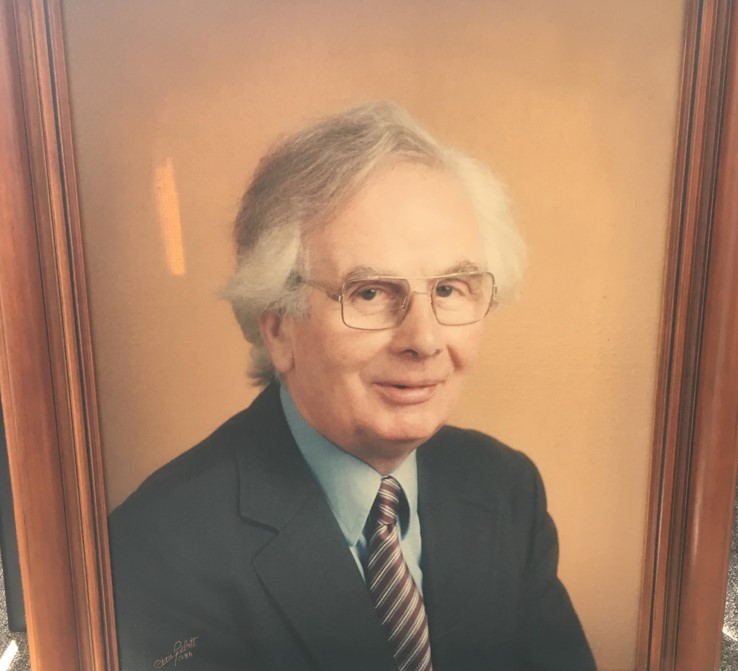Many charities named after their founders would have to trace their lineage back further than 50 years, however with Gordon Moody’s history being more recent, in relative terms, we can connect more directly to the context and aims and aspirations of the man who started it all.

Pictured: The Rev Gordon Moody in 1971
The Reverend Gordon Moody MBE (5 December 1912 – 30 September 1994) devoted much of his life to studying and helping to tackle problem gambling in Britain.
He had been a Methodist clergyman for a number of decades – with ministries in Leicestershire, Derbyshire, Cheshire and Devon, as well as serving as an RAF chaplain in England and Singapore – when a friend suggested he apply for the role of the Secretary of the Council of Churches’ Council on Gambling.
Despite being initially sceptical – particularly because of his own lack of knowledge about gambling – he accepted the job in 1958 and stayed in post for 20 years.
Lifelong mission
That started a lifelong journey of learning that saw his campaigning greatly influence government and gambling acts passed in Parliament.
More significantly he set about to practically change the way problem gambling was dealt with, which led to the establishment of Gordon Moody House in 1971, that in turn led to Gambling Therapy starting up in 2004 and the Gordon Moody Association being incorporated in 2007.
As Gordon Moody said on his appointment in 1958: “This made me the one and only person in the land who was paid, full-time, to keep an eye on gambling.”
Although it was expected that his church background might make him anti-gambling on moral grounds, this in fact was not true.
He felt that arguing about the rights and wrongs of gambling was the wrong ethical issue. The far more urgent issue to him was the destruction caused by a problem gambler to him or herself and to their families. It was not enough for the Methodist Church to simply say ‘do not gamble’ because there were ‘real’ people who were suffering because of the addiction.
His primary conclusion about gambling was that it was not a vice, nor was it a crime or a reflection of some psychological disorder. Rather, people gambled because they enjoyed it. The inescapable fact was that for a lot of people “it was fun”.
However, he did not minimise the risk and damage that problem gambling could bring.
This led him initially to start helping gamblers in trouble in 1964, through his founding a British branch of the US organisation Gamblers Anonymous.
It was in May 1964, at a public meeting through the Churches Council on Gambling he had organised, he met a couple of Americans, Henry and Vivian, who were temporarily working in this country.
Henry was a member Gamblers Anonymous and his wife of the supporting group Gam-Anon. In Gordon’s own words it was this ‘vivid encounter’ which prompted him to work with them to start the very first group in England later that same year.
By the second half of the 1960s, Gordon Moody began to organise a number of conferences that attracted doctors, psychiatrists, probation officers, magistrates, social workers and psychologists, with titles such as Compulsive Gambling and Delinquency. These took place around the country and played a significant role in raising the profile of problem gambling as well as highlighting the lack of treatment facilities.
This in turn led him to conclude that a specialist facility for problem gamblers who were alone and homeless, was needed.
Gordon, in his true fashion, sought advice and help as well as involving understanding friends to create such a safe place, and this was realised in 1971 when Gordon House in South-East London was opened.
Gordon House
In order to secure the necessary funds to run the project he had to compromise by restricting admissions to those caught up in the criminal justice system.
While working within Gamblers Anonymous, Gordon Moody had realised that many individuals, despite attending weekly meetings, were struggling with their addiction in between meetings largely due to the fact that they had nowhere to live or had very little support from others. Without a safe place to focus on their recovery it was very difficult to resist the urge to gamble and to start work on overcoming the addiction which was blighting their lives. In the years immediately following the opening of Gordon House, experience of working in a residential setting with a client group developed into the unique therapeutic residential programme which is offered today.
His pioneering work was recognised in 1969 when he was awarded an MBE. Being the modest person he was. Gordon only used this honour when he felt it was useful to further his efforts to establish treatment facilities for problem gamblers and research into aspects of gambling.
Today, nearly 30 years after the Reverend Gordon Moody’s death, it is remarkable how many recovering service users say that Gordon Moody “saved their life”.
They of course are referring to the organisation and its current staff and services, but without the open-mindedness, dedication and tenacity of the man who started it and whom the organisation is named after, then their unique to recovery would not have been possible.